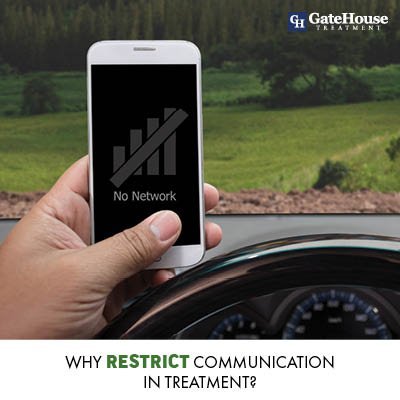
“Life is like a landscape. You live in the midst of it but can describe it only from the vantage point of distance.” – Charles Lindbergh
I’ve been to treatment a few times. Always after some failed attempts at stopping on my own. Even if it’s not the last house on the block, it is indeed further down the block. My mind and emotions would run wild. The fears would flood through the broken dam of my mind like a tidal wave. What’s going to happen with my finance, my girl, my friends, and worst of all my dog? Everything flashed before my eyes. I was sure I would lose everything. The walls of my life closed in on me so hard I could become claustrophobic even outdoors. Then upon intake in treatment, the communication restriction was experienced as a form of death.
Why Communication is Restricted During Inpatient Drug Treatment
Many experience going into addiction treatment the same way. These are mind tricks. The truth is whatever life we had, even if the outside appeared or really was well put together, was falling apart. While not in treatment, we deployed every means to hold it together as best we could. These attempts often failed time and again while anxiety and consequences mounted leaving a trail of pain behind for us and those close to us. Often the truth that goes unnoticed is the blessing of falling apart. When a person’s life is smashed into pieces, a window opens. The opportunity to consciously select what parts to put back together is presented; this often requires help. It has been said that “distance gains perspective.” A communication blackout can be the perfect opportunity to evaluate and regroup. New patterns of behavior are a must for the suffering addict or alcoholic. To create a new habit or pattern, some assistance is needed. Time, distance, and practice can be extremely helpful. There are two simple reasons why limited communication can make a world of difference.
Triggers
This is a controversial topic between 12 steppers and professionals. Let’s clear the air. There are two different kinds of triggers that are often mistaken for each other. The recovery community debates triggers that can lead to using drugs. One side adopts, that the “obsession to use or drink” is either present or not. The original recovery literature makes no mention of triggers. The other side of this debate is that outside factors like people, places, and things can “trigger” a person to pick up. That isn’t the kind of trigger discussed here. Emotional triggers are not debatable. Just walk into a room with a former lover that you’re not entirely over and find them with the next lover and the pit in your stomach will confirm how real they are.
Family dynamics, unhealthy relationships, and reoccurring arguments are pathways to emotional triggers. These wounds never get a chance to scab and stay festering without proper skills. Limited phone contact combined with family therapy sessions allow for identifying and correcting the patterns in question.
Knee-jerking
Most, if not all of the damaging decisions that we have followed through on as addicts, have at least two things in common. First, they seemed like a good idea at the time. Secondly, they were also made based on emotion. Knee-jerking is common and hurtful. Impulsive decisions can be made in seconds yet cause irreversible damage that can last a lifetime, maybe even end a life. While in the incubator of treatment these actions and reactions can be adequately evaluated, identified and addressed with minimum consequences. The limited contact with family allows for the emotional dysfunctions behind these instances to surface in a safe environment. This process although uncomfortable, is conducive to healing.
Limited contact allows for the family to touch base long enough to show support, give love, and help assist with any outside loose strings while simultaneously allowing the patient to start their journey and acquire the much-needed skills to start life over after discharge. Having a period of time to focus wholly on substance abuse treatment at whatever clinical level of care you may be at, is of the utmost importance.
- Cymbalta Withdrawal: Causes, Symptoms, And Management - October 12, 2023
- Boredom in Recovery: 5 Tips to Avoid Relapse - October 6, 2023
- Overconfidence and Rehab: Avoiding Relapse - October 4, 2023




